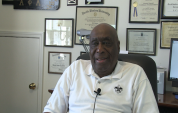1:58 | As with many career service members, service did not stop for LC Johnson after he retired. He has a hand in many fine organizations and advocates for the care and the rights of veterans.
Keywords : LC Johnson Salvation Army veterans American Legion Veterans of Foreign Wars (VFW) Tuskegee Airmen Veterans Administration (VA)

The Vietnam War was starting to slow down when LC Johnson arrived in 1972. His logistics skills were needed to get some expensive furniture used by the brass back to America. He did have one spine tingling moment during a rocket attack, but thankfully his battles were mostly played out on the baseball field.
The bomber jacket worn by a hometown character caught LC Johnson's young eye, so he always had the Air Force on his mind, not the Army. He was stationed at isolated radar sites in the Southwest, at first. Then he got his first taste of a real Air Force base in Japan, where he worked in supply and at the clubs on base.
As he progressed in the Air Force at a number of bases, logistics expert LC Johnson enjoyed the environs of places like Los Angeles and England. When he got to Korea, he had a role to play in the Pueblo incident as the man who knew the nuts and bolts of that area of operation.
Whether to stay in the service or move on is a question that is well known to service members. For LC Johnson, it was an easy choice. It was a down economy, he had limited options at the time because of his race, and, most importantly, his mother said it was a good idea.
People skills and networking allowed LC Johnson to rise in the Air Force and they also enabled him to succeed in the field of education after he retired. From guidance counselor to superintendent, it was a mirror of his military career.
LC Johnson pays tribute to colleagues who helped make his career so very successful, starting with his supervisor from his tour in Vietnam, Jim Peterson.